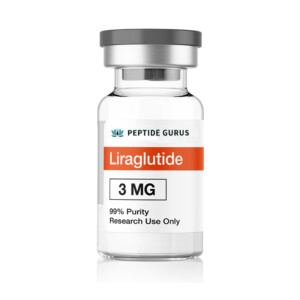Liraglutide, a significant peptide in the medical field, has been a subject of extensive research, especially regarding its role in weight loss. This article delves into the details of liraglutide peptide, its approval status by the FDA, and most importantly, its weight loss mechanism.
What is Liraglutide?
Liraglutide is a synthetic form of the naturally occurring glucagon – like peptide – 1 (GLP – 1). It belongs to the class of drugs known as glucagon – like peptide – 1 receptor agonists (GLP – 1 RAs). Structurally, it has 31 amino acids and shares 97% identity with the active form of the hormone GLP – 1(7 – 37). It has been modified; lysine at position 34 of GLP – 1(7 – 37) is replaced with arginine, and a palmitate is added to the amino acid lysine at position 26 via a spacer glutamic acid residue. This attached fatty acid moiety binds to serum albumin, which delays renal excretion, resulting in a half – life of 13 hours in humans.
FDA Approval
The United States Food and Drug Administration (FDA) has given liraglutide approval for multiple indications. In 2010, it was approved for the treatment of type 2 diabetes. Then, in 2014, it was approved as a treatment for overweight or obese adults. In 2020, this approval was extended to adolescents for the same indications. This shows that liraglutide has been thoroughly studied and deemed safe and effective for these uses.
Weight Loss Mechanism
- Appetite Suppression
-
- Liraglutide activates the GLP – 1 receptors in the central nervous system, particularly in areas related to appetite regulation. By doing so, it promotes satiety, which means that individuals feel full and satisfied with less food intake. When the brain receives signals from the activated GLP – 1 receptors, it reduces the feeling of hunger, leading to a decrease in overall calorie consumption. For example, studies have shown that patients taking liraglutide report a reduced desire to eat, especially between meals.
- Slowing Gastric Emptying
-
- In the gastrointestinal tract, liraglutide activates GLP – 1 receptors to slow down gastric emptying. When the stomach empties more slowly, the body has a more gradual release of nutrients into the bloodstream. This not only helps in better blood sugar regulation but also contributes to a feeling of fullness for a longer period. Research has indicated that within the first hour of administering a 3.0 mg dose of liraglutide, there is a 23% reduction in gastric emptying speed compared to a placebo, and it takes about 4 hours for gastric emptying to return to normal pace.
- Effect on Adipose Tissue
-
- Scientists suggest that liraglutide may interact with GLP – 1 receptors in adipose (fat) tissue. This interaction might reduce the release of triglycerides (a type of fat) into the bloodstream and increase insulin sensitivity. When insulin sensitivity is improved, the body is better able to use glucose for energy instead of storing it as fat. As a result, over time, this can lead to a reduction in overall body fat, contributing to weight loss.
Clinical Evidence of Weight Loss
Numerous clinical trials have demonstrated the effectiveness of liraglutide in promoting weight loss. A large meta – analysis covering over 6,000 participants, which included only studies lasting more than 12 months and with a liraglutide dosage of 3.0 mg, revealed that the peptide causes an average weight loss of 4 – 6%. Another trial in obese patients with chronic obstructive pulmonary disease reported an average weight loss of 8.2 kg after 20 weeks of daily administration of 3.0 mg liraglutide.
Frequently Asked Questions
- Q: Is liraglutide safe for long – term use?
-
- A: Liraglutide has been approved by the FDA for long – term use in both diabetes management and weight loss in appropriate patients. However, like any medication, it may have potential side effects. Common side effects include nausea, diarrhea, vomiting, constipation, and abdominal pain, especially at the start of treatment. These side effects usually subside over time. It’s important to discuss with your doctor the potential risks and benefits based on your individual health situation.
- Q: Can liraglutide be used without a prescription?
-
- A: No, liraglutide is a prescription – only medication. Due to its potential effects on the body’s metabolism and the need for proper monitoring, it should only be used under the supervision of a qualified healthcare provider. Your doctor will assess your medical history, current health status, and other medications you are taking to determine if liraglutide is suitable for you.
- Q: How long does it take to see significant weight loss with liraglutide?
-
- A: The time it takes to see significant weight loss can vary from person to person. Generally, clinical trials have shown that some weight loss can be observed within a few weeks of starting the treatment. However, significant weight loss, such as a 4 – 6% reduction in body weight as seen in some studies, may take several months of consistent use at the appropriate dosage. It’s also important to note that liraglutide is most effective when combined with a healthy diet and regular physical activity.
